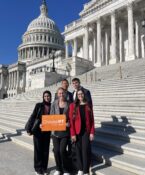Estrogen protects brain in trauma victims
In a groundbreaking study, researchers from the University of North Texas Health Science Center in Fort Worth and the University of Texas Southwestern Medical Center in Dallas are partnering to battle the effects of traumatic brain injury, shock and sudden cardiac arrest.
James Simpkins, PhD, chair of the Department of Pharmacology and Neuroscience and director of the Institute for Aging and Azheimer’s Disease, has partnered with Jane Wigginton, MD, of the Emergency Medicine department at UT Southwestern, to study the protective effects that estrogens have on patients who need emergency resuscitation, specifically those with traumatic brain injury, shock and sudden cardiac arrest. These studies are critical because fewer than 5 percent of the 1,000 Americans who suffer sudden cardiac arrest survive.
"The hope is to devise an intervention so when emergency medical personnel show up and they deduce that someone has had traumatic brain injury, a stroke or sudden cardiac arrest, they can then, on site, administer something that can protect the brain," Simpkins said. "If we can administer these drugs to people very early, we can protect the brain and increase survival."
This new study has found that the rapid administration of a combined dose of estrogen, a strong anti-oxidant and an anti-inflammatory drug in sudden cardiac arrest cases increases brain cell survival by up to 65 percent. Additionally, it was found that the same combination of estrogen and other substances delivered intravenously post-injury may have similar effects in subjects suffering from traumatic brain injury.
Simpkins explained that right now, emergency medicine procedures are in place to immediately work to resuscitate patients who have suffered one of these traumas, but typically resuscitation efforts are designed to make a person’s heart start beating again, for example, or restart breathing. However, until now, no measures have been put into place to attempt to protect the brain’s health in the case of a traumatic injury requiring resuscitation efforts.
"We have to act as soon as possible when emergency medical crews arrive on the scene," Simpkins said. He explained that by the time an emergency crew has performed resuscitation efforts, then transported a patient to a hospital, and the patient is stabilized enough to undergo the tests necessary to determine if there is brain injury, it is often too late.
"We know these substances can protect the brain and are safe to send out with emergency medicine personnel," he said. These compounds can be easily administered to a patient on-scene to provide the necessary protection to the brain. Importantly, the compounds have no dangerous effects on a patient if they do not have any sort of brain injury.
Simpkins said he is passionate about this study because he lost his father and grandfather to strokes – but there were no medical procedures in place to protect the men’s lives. By the time the necessary help arrived and tests were run, it was too late, Simpkins said.
"There has to be a paradigm shift in that we need to administer these treatments as soon as possible, before it is too late," he said. "This can improve survival and reduce neurological deficits from shock. It is very much needed."
This study is part of the Resuscitation Outcomes Consortium, a National Institutes of Health-funded program designed to study cardiac arrest and trauma events in patients, the outcomes of these events, and how treatment in the field immediately after these events affect patient survival rates.





Social media